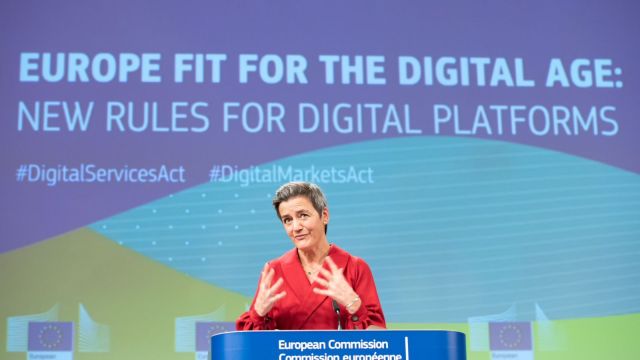How EU antitrust chief Margrethe Vestager shaped big tech regulation in the region
Here’s a look at the role Margrethe Vestager has played in defining the EU’s stance on competition in the digital age.
 Margrethe Vestager was appointed as the European Commission's competition chief in 2014. (Image source: X/Margrethe Vestager)
Margrethe Vestager was appointed as the European Commission's competition chief in 2014. (Image source: X/Margrethe Vestager)Over the past decade, regulators in the European Union (EU) have not only waged tough antitrust battles against US-based tech giants such as Google and Apple, but also notched up some significant wins. Margrethe Vestager, the EU commissioner of competition, has been at the forefront of these regulatory efforts.
Recently, the antitrust chief emerged victorious in a protracted legal battle against Apple over unlawful aid that was given to the iPhone maker by the Irish government. The final ruling delivered by the EU’s top court means that Apple will have to clear a whopping 13 billion euro unpaid tax bill. Hailing the judgment, Vestager said, “Today is a huge win for European citizens and tax justice.”
Vestager’s double tenure as antitrust enforcer also saw the introduction of stringent new regulations such as the Digital Markets Act (DMA) aimed at reigning in the dominance of big tech companies. With Vestager preparing to leave office later this year, here’s a look at the role she has played in defining the EU’s stance on competition in the digital age.
Vestager’s political origins
While many know her as the EU antitrust cop, the Danish national had a long political career prior to the top job. Having graduated from the University of Copenhagen with a master of science in economics, Vestager was appointed as head of secretariat with the Danish Agency for Financial Management and Administrative Affairs from 1997 to 1998. For the next four years, Vestager served as the minister for education in the Danish government.
She became the leader of the Social Liberal Party and held the office of minister for economic affairs and the interior from 2011 to 2014. During this time, Vestager was also heavily involved in setting up the European banking union.
In 2014, Vestager was appointed as the European Commission’s commissioner of competition. She later went on to become the bloc’s executive vice president incharge of digital affairs in 2019.
Her rapid rise from the leader of a small party to a top EU official is said to have inspired the character of Birgitte Nyborg Christensen in a Netflix series known as Borgen.
EU antitrust regime under Vestager
Summing up Vestager’s 10-year tenure, Georg Riekeles, associate director at the European Policy Centre, told Financial Times, “In her first term, Vestager was seen as a tough enforcer and in her second term, she helped craft the powerful new rule book for tech giants.”
Surprisingly, one of Vestager’s early regulatory actions in her role as EU competition chief was not against Google or Amazon but, instead, targeted a merger of assets between two telecom network operators, UK-based Hutchison and Spain’s Telefónica.
Since 2017, Vestager has pursued three separate antitrust cases against Google and levied fines amounting to a total of 8.25 billion euros against the search giant for allegedly abusing its market dominance through its shopping platform, Android operating system, and adtech service. The company has appealed against all three rulings, one of which was recently upheld by an EU court while proceedings are pending in the other two .
Vestager also initiated a trio of antitrust probes against Apple, two of which pertain to the company’s App Store practices while the other case is related to Apple Pay. Meanwhile, Amazon agreed to change some of its business practices in the region to avoid paying a multibillion-euro fine, whereas Meta’s alleged anticompetitive practices related to its marketplace service is under the scanner as well.
Besides her market abuse cases, Vestager has also targeted tech giants over corporate taxes. She previously ordered Amazon to repay hundreds of millions of euros in taxes, and has clamped down on preferential tax treatment offered by local governments to tech companies in exchange for setting up offices there – actions that had angered then-US President Donald Trump enough to call her the ‘tax lady’ who “really hates the US.”
Vestager’s views on competition policy
In an interview with CNBC earlier this year, Vestager spoke about the importance of competition in the EU’s digital markets. “Competition is part of the solution. You are more resilient if companies have supplies to choose from. You are more resilient if you have customers to serve, if one customer fails you, you have others instead,” she said.
“It’s really important that we keep having competition so that we can keep innovating on how (digital) tools work,” she added.
On competition in the AI sector, she said, “It is important to be able to assess who is controlling what because the AI tech rage has only begun. So, it is really important that we do not get entrenchments of AI and Big Tech as we know it by making sure that many can participate in the development of different types of AI as we have so many use cases.”
Vestager further stated that the EU’s Digital Markets Act could help address new questions that emerge on competition in the AI industry.
Responding to criticism that the DMA is ineffective in forcing tech giants to alter their anti-competitive behaviour, Vestager said, “With the DMA, we are getting closer and closer to the business model. If you cannot promote your own services and need to give room to competitors, rightfully and legitimately so, that will potentially take away some of your own profits. It will be a difficult enforcement task but so much more rewarding for competitors of Big Tech.”
With the Danish government confirming that it will nominate a different candidate as their European commissioner, the question on everyone’s mind is who will succeed Vestager as the EU antitrust chief, a role that is set to become more critical than ever due to the fresh regulatory challenges posed by AI.







